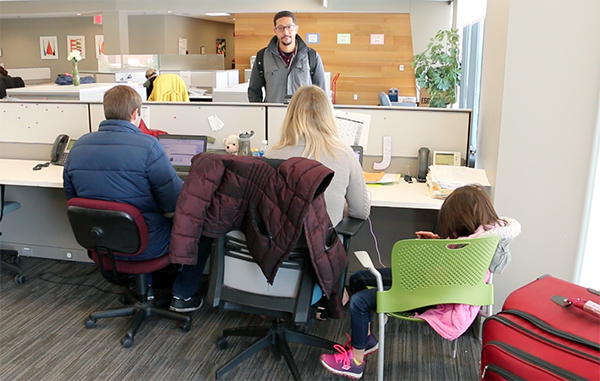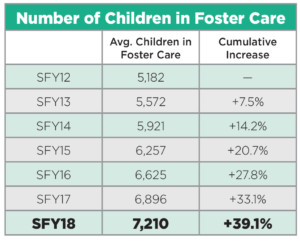A Fast, Proven Way to Strengthen the Kansas Child Welfare Workforce

Double-digit vacancies in case manager jobs and other child welfare positions is contributing to high caseloads, burnout and turnover. By following other states’ lead in allowing professionals with equivalent college education and experience to do case coordination, we can reduce vacancies by up to 90%. This approach also improves child and family wellbeing.
Last month, KVC Kansas released an infographic called “Kansas Child Welfare System: Understanding the Real Challenges and Best Solutions.” In it, we showed how a wide range of factors have led to 39% more children in foster care over the last five years, fewer placement options and soaring costs, and severe workforce challenges. This “perfect storm” of challenges has led to declining performance by our state and our agency on several child and family outcomes. It is a problem which must be addressed immediately.
 It’s important that we act with urgency, “in child time,” to safely prevent and reduce the number of children in foster care, increase safe placement options for children, and strengthen the child welfare workforce.
It’s important that we act with urgency, “in child time,” to safely prevent and reduce the number of children in foster care, increase safe placement options for children, and strengthen the child welfare workforce.
In this article, we want to take a deeper dive into what we believe is the single best way to quickly and fully staff our child welfare services and strengthen support to children and families.
When a child is removed from his/her home and placed into foster care, the child is assigned a case manager who is responsible for coordinating his/her support services and helping the child return to a safe, loving home. But a national social worker shortage, increasing demand and shrinking resources have made it difficult for child welfare agencies including ours to attract and retain enough talented case managers and other social workers. In some areas, especially rural and frontier areas, this has led to a vicious cycle of burnout and attrition.
To solve persistent challenges in retaining child welfare staff which has caused high caseloads, high turnover, and lower quality in services, we recently advocated for an innovative expansion of how we educate and train people to perform this work.
The Problem
In the past, most child welfare positions were only open to licensed social workers. A person can only obtain a Kansas social work license if their college degree is in social work specifically, which limits the candidate pool.
More than a decade ago, the state began allowing contractors including KVC Kansas to hire licensed professionals in related fields – for example, licensed professional counselors (LPC/LCPC), licensed marriage and family therapists (LMFT/LCMFT), and licensed addiction counselors (LAC/LCAC) – to fill these roles. This shift has been proven successful because it provided a wider pool of job candidates with a broader, richer depth of training and experience.
In recent years, it has become increasingly difficult to attract licensed professionals to apply to case coordination roles. In rural areas especially, there are often NO qualified, licensed applicants for vital child welfare positions. This lack of applicants means that the licensure requirement is impeding the quality it is meant to ensure, leaving many children and families with inadequate support.
Looking to the example of other states’ child welfare systems and even the medical field, we know there is a relatively quick, safe and smart way to address this problem.
The Solution
Due to this workforce crisis, KVC Kansas proposed and we are appreciative that the state recently approved an innovative pilot program.
The idea is simple: After a public job posting in which no qualified licensed professionals apply, non-licensed professionals with equivalent college education and six months’ experience in child welfare are allowed to apply. The professionals have bachelor’s and/or master’s degrees in related fields such as psychology, sociology, counseling, and child development. Enhanced training and supervision are provided to ensure these professionals demonstrate the same quality in job performance.
This program maintains a preference and pay differential for licensed professionals. The positions only become open to non-licensed professionals with equivalent education when no qualified, licensed workers apply.
Hiring people with equivalent education and experience mirrors the medical field. For example, the shortage of registered nurses (RNs) is being filled with LPNs and supplemented with CNAs. The shortage of doctors (MDs) is being addressed by allowing nurse practitioners, APRNs, PAs, DOs and others to fill the physician role. The idea also matches the way that many other states maintain a qualified child welfare workforce; states including Missouri, Nebraska, Illinois, Florida, Kentucky and West Virginia already allow non-licensed professionals with college degrees to do case management and other social work.
Non-licensed professionals are supervised by a licensed supervisor or director who provides a minimum of one hour dedicated supervision per week and is available at any time for questions and support.
The duties of these positions include providing family-centered, in-home case management services to children and families, organizing and facilitating case planning conferences, assisting parents in finding community resources, and more. The duties do not include providing the therapeutic or clinical interventions.
Anticipated Results
So far, the program has begun with a handful of people in our preventative services (Family Preservation). It is critical that the program be expanded as soon as possible to our Permanency program (Foster Care/Adoption) as that’s where needs are the greatest. Our case managers, particularly in our Permanency Department, are the professionals who are closest to and responsible for each of the 7,000+ Kansas children in foster care.
When fully implemented within KVC Kansas, we expect to reduce vacancies of licensed social work positions by 75% within 90 days. Within 180 days, we expect vacancies to be reduced by 90-95%.
The program will:
- Reduce caseloads
- Reduce turnover
- Allow supervisors to focus coaching and supporting their teams
- Provide greater consistency with families due to reduced turnover.
- Ensure better outcomes for children and families including more timely permanency for children
- Create new opportunities for advancement in child welfare, encouraging professionals to choose a career where they can help vulnerable children and families.
We ask for your support for this program, and look forward to working with the state to continuing to implement this program and report on the results.

Related articles:
- Too Many Children in Foster Care: KVC Kansas Shares Challenges and Solutions [Infographic]
- Why Child Welfare Privatization Made Kansas a National Leader
- How KVC Kansas Is Supporting and Retaining Its Child Welfare Staff
- Answers to FAQs: Understanding KVC Kansas’ Role in the Kansas Child Welfare System
- Children Need Families | An Open Letter from KVC Kansas President Danielle Bartelli to KVC Team
- How We Can Improve the Child Welfare System as a Community